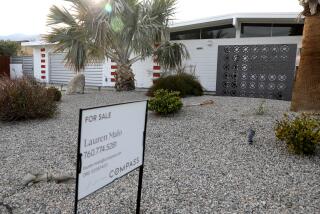Before You Buy, Figure Out What You Really Want
- Share via
Are you a young single from the post-boomer era with a healthy income, surplus cash and a strong inclination to invest in a home? Yet are you clueless on what to buy?
Then find an unflappable agent who will spend as many weeks as it takes to unlock your hidden desires and who will also help you find a place that will gain value.
“You want somebody who knows her turf, not an agent with a map in her hand,” says Elaine Sweeney, a sales manager for Coldwell Banker.
Most of today’s young adults, born after the baby boom birth surge that ended in 1964, know how to use computers to generate information on home listings and other real estate data, Sweeney said.
But just because you’re a technologically-savvy buyer doesn’t mean you don’t need a skillful agent to help you set priorities and buy for the future as well as for the present, she said.
“Generation X, which is booming onto us now as home buyers, are bright and purposeful. But they want--and need--service,” said Sweeney, who has a 23-year-old daughter and a 27-year-old son.
When you’re young, discovering what you want in a first home can be baffling. Perhaps you’ve given more thought to your career and social life than your housing plans.
One early step in the discovery process is to answer a series of questions about your current and future lifestyle intentions, said Jeanette Coombs, a Century 21 agent.
“The key question to ask is ‘Where do you want to be five years from now?’ ” Coombs said. “Do you want to live near your work or commute to a sleepy town that rolls up the sidewalks at 8 o’clock?”
Leo Berard, the broker-owner of an independent realty chain, likes to use a written survey to quiz prospective first-time buyers on what they like or don’t like about their present rental situations.
Berard finds the comments on his surveys both revealing and useful. Many prospects say they want bigger kitchens and more open floor plans than they have in their rental units. (A house with small, boxy rooms is not something most contemporary buyers relish.) Other renters complain about the noisy streets where they live.
On the positive side of the ledger, some renters report a fondness for the architectural style of the place they’re leasing. And others--albeit a minority--register satisfaction at living near members of their extended families.
Another crucial question to ask yourself is how the home you buy will be used, said Berard, the president of the National Assn. of Exclusive Buyer Agents, a professional group of those in the realty field who represent only buyers.
Are you planning to have a lot of parties? Then, Berard said, your best bet is a home where rooms flow gracefully into one another, rather than one where walls define rooms in a traditional manner.
Buyers who relish entertaining with backyard barbecues are best suited to a place with an ample rear lot, preferably one that has a privacy fence or no neighbors’ homes right behind, said Claire F. Lane, a broker associate for the Re/Max realty chain.
“Privacy is very important to a lot of singles,” he said.
Here are five other clues for young singles and others seeking a first home.
No. 1: Find a real estate agent who communicates the way you do.
Like any other relationship, the one between an agent and her client is based on rapport. But not everyone likes to communicate the same way, noted Sweeney of Coldwell Banker.
“If you love e-mail, don’t get someone who loves voice mail,” she said.
No. 2: Focus seriously on resale prospects for the home you buy.
It’s expensive to buy and sell a home. And, with a few exceptions, you’re better off if you can hold the property for at least five years, real estate specialists say.
Yet five years is a long time in a young adult’s life, and your priorities may change dramatically. Perhaps you’ll marry and start a family within five years.
Unfortunately, too many first-time buyers see their housing needs only in the present, as if life were a still photo. Instead, think of your plans as a film that moves forward into your future.
Even if marriage and family are the last things on your mind, you’re usually better off buying in a family-oriented neighborhood than one primarily inhabited by single people, says Lane, the Re/Max broker-associate.
“The family neighborhood is almost always better for resale, rather than a community with just one age group,” she said. Why? Because there will be more potential buyers for your home in a community that appeals to families as well as to singles.
No. 3: Think about recreational benefits in the community you chose.
If you’re like many in the post-boomer generation, exercise is of major importance to you, Lane said. If that’s the case, ask your agent about the proximity of hiker-biker trails, tennis courts, health clubs and other exercise facilities.
No. 4: Consider buying a place with quarters for boarders.
A single person who buys a home with several bedrooms may have excess space and the chance to make extra income by sharing housing with a boarder, said Berard, the independent broker-owner.
What makes an ideal bedroom to rent out? Preferably one with its own bathroom or separate entrance, Berard said. Also a good choice is a two-level property with a main floor master suite, where the owner can have privacy while the boarder resides upstairs.
No. 5: “Test drive” a neighborhood before you commit to it.
In the past, there’s been a major difference between childless singles and the parents of young children: their tolerance for a long commute. More people without kids have been willing to drive a long way to work, said Coombs of Century 21.
Still, the choice between a long commute and a quiet neighborhood or the reverse can be vexing, even for those without children to tend.
One way to make the choice is to try the long commute during rush hour and see if it’s unpleasant or well worth the distance. Living in a quiet area calms the nerves of many, Coombs said.
Why? “Because life is so hectic to begin with,” she said.
*
Distributed by Universal Press Syndicate.
More to Read
Inside the business of entertainment
The Wide Shot brings you news, analysis and insights on everything from streaming wars to production — and what it all means for the future.
You may occasionally receive promotional content from the Los Angeles Times.










